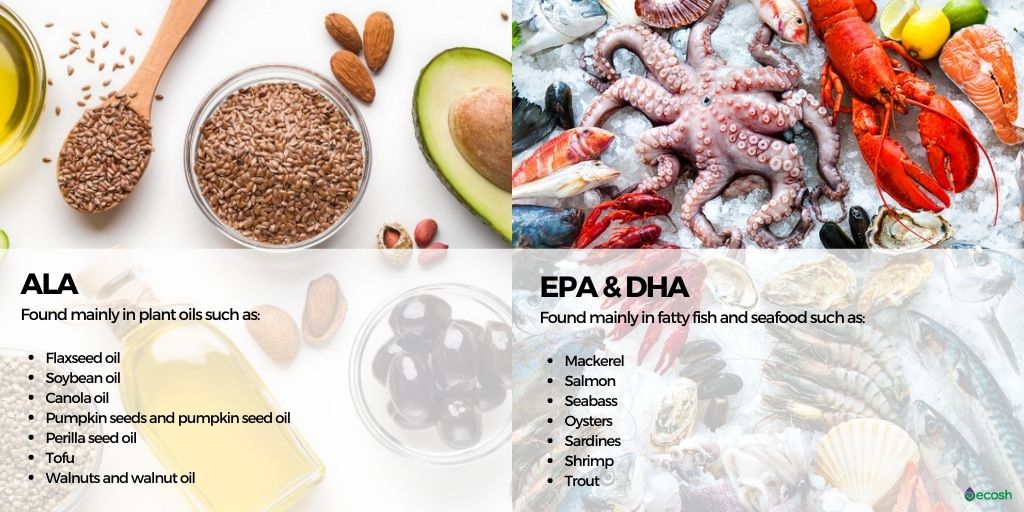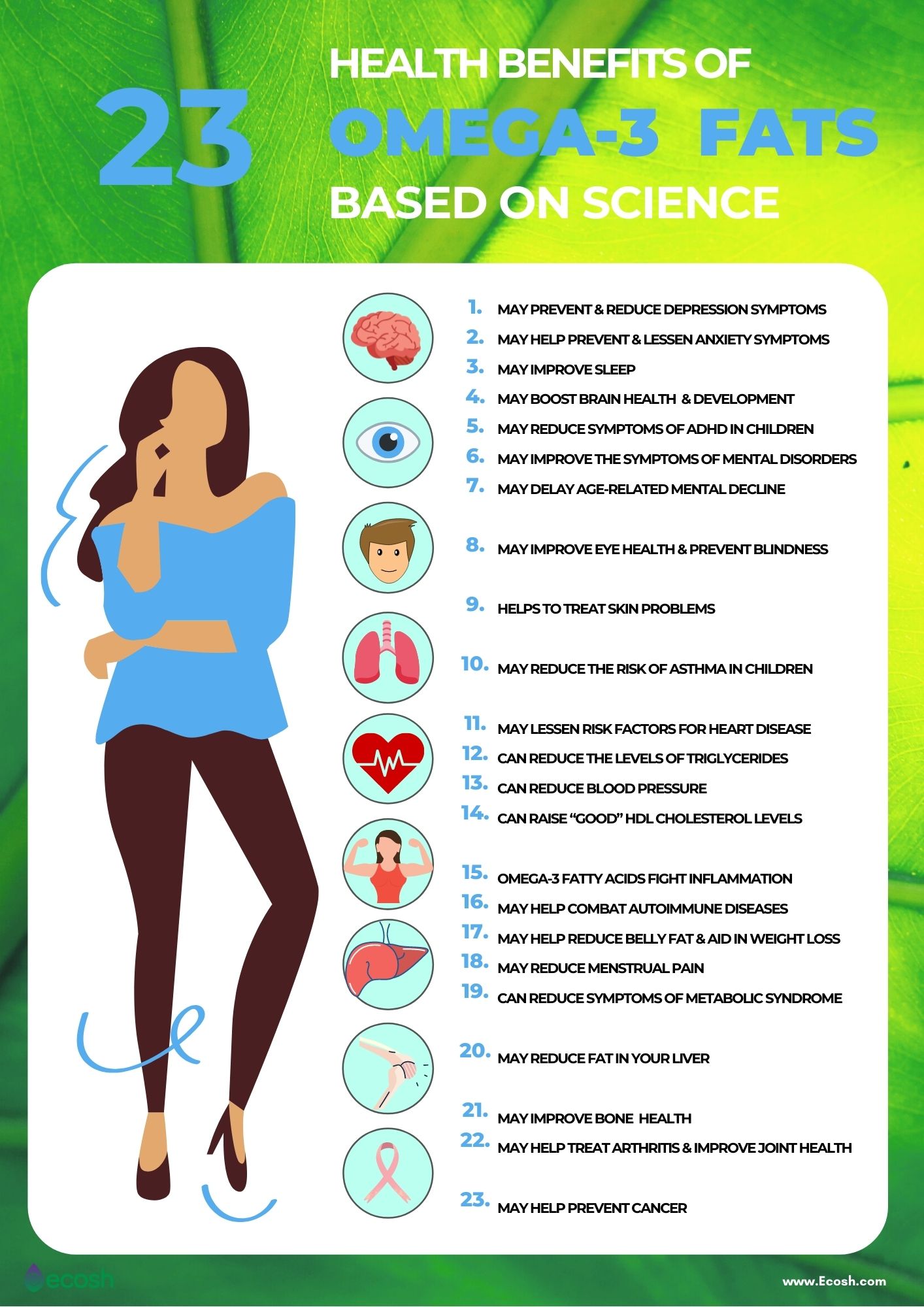Omega−3 fatty acids, also called ω−3 fatty acids, Omega-3 oils, or n−3 fatty acids, are polyunsaturated fatty acids that are incredibly important for your body, for your brain as well as for your mind. These fatty acids are vital components of the membranes that surround each cell in your body, and have many powerful benefits for your brain, immune system, heart, blood vessels, lungs, and for the network of hormone-producing glands.
In short, your body won’t simply manage well without omega-3s, and the lack of these fatty acids have been linked with several physical and psychological diseases as well as developmental delays in children.
The good news is that there are many natural and simply available sources of omega-3s. The best way to ensure you get an adequate amount of these essential fatty acids – is to consume enough fatty fish about two times per week. However, if you don’t like fatty fish or don’t eat it for other reasons, you may want to consider taking a fish oil or omega-3 supplement, as these are a cheaper and extremely effective way to improve health for individuals with omega-3s deficiency (2, 99).
Here in this article we write all there is to know about omega-3 fatty acids. You will learn about the symptoms and risk factors of omega-3 deficiency, the most omega-3 rich foods, adequate amounts of omega-3 intakes, which omega supplements are the best, and most importantly the amazing 23 health benefits of omega-3 fatty acids based on science.
Omega-3 Fatty Acid Deficiency Signs and Symptoms – What Happens When You Don’t Get Enough Omega-3 Fatty Acids?
When your body does not get enough omega-3 fatty acids, you may develop deficiency that can eventually lead to serious health problems. Here are some signs and symptoms that signal omega-3 deficiency.
- Dehydration, thirst, dry mouth/throat, or frequent urination
- Fatigue
- Trouble sleeping
- Concentration problems, attentiveness or poor memory (in children and adults)
- Irritability, restlessness, anger and anxiety. People who seem to anger quickly for no reason may actually suffer from omega-3 deficiency
- Adverse effects on brain development and neurodevelopmental outcomes
- Depression
- Mood swings
- Stiff or painful joints
- Leg cramps
- Allergy symptoms such as hives, hay fever, asthma, and eczema can all indicate lowered omega-3 levels
- Excessive ear wax
- Cardiovascular concerns
- Difficult menstrual cycles, or prolonged, heavy periods with clotting
- In addition, problems with skin, hair and nails such as:

Omega-3 Fatty Acids Deficiency Complications – What are The Diseases Related to Omega-3 Deficiency?
The lack of omega-3s may lead to severe health conditions such as:
- Cancer
- Heart Disease
- Stroke
- Alzheimer’s
- Multiple Sclerosis
- Breast Cancer
- ADD/ADHD
- Diabetes
- Obesity
- In conclusion, cardiovascular Disease (6).
Omega-3 Fatty Acid Inadequacy Risk Groups and Risk Factors
People who may suffer from omega-3 fatty acids deficiency and should add omega-3 supplements in their diet include:
- Vegans
- Individuals who restrict fat in their diet
- People who do not consume enough fatty fish
- In addition, individuals whose diets are high in red meat and poultry (2).

Types of Omega 3 Fatty Acids – What is The Difference Between ALA, EPA and DHA?
Overall, there are three kinds of omega-3 fatty acids: ALA, EPA and DHA. All these fatty acids are vital components of the membranes that surround each cell in your body. You can get omega-3s from certain foods and dietary supplements.
- Alpha-linolenic acid (ALA): naturally found mainly in plant oils such as flaxseed, soybean, and canola oils. Also in pumpkin seeds and pumpkin seed oil, perilla seed oil, tofu, walnuts and walnut oil. ALA is an essential fatty acid, which means that your body can’t make it. Therefore, you must obtain ALA from the beverages, foods or supplements you consume.
- Eicosapentaenoic acid (EPA): naturally found in fish and other seafood. Although your body can convert some ALA into EPA and then to DHA, it can be done only in very small amounts. Therefore, getting EPA and DHA from foods and dietary supplements like fish oil is the only practical way to increase levels of these omega-3 fatty acids in your body.
- Docosahexaenoic acid (DHA): naturally found in fish and other seafood. EPA and DHA rich foods include mackerel, salmon, seabass, oysters, sardines, shrimps and trout. In your body, DHA levels are particularly high in the brain, retina (eye), and sperm cells (2).
Omega 3 Suggested Dosages – How Much Omega-3s Should I Take?
According to the National Institutes of Health (NIH), to date, there is not enough data available to establish a recommended daily allowance (RDA) of omega-3 for healthy adults. For adults, there are also no specific recommendations for EPA, DHA or other LC omega-3s separately, and these exist only for infants. Therefore, if you take omega-3 supplements read the suggested dosages on the product label.
However, the Food and Nutrition Board of the Institute of Medicine (IOM) has established an estimated adequate intake (AI) for ALA, because ALA is the only omega-3 that is essential. AI is the amount a person needs to ensure nutritional adequacy (2).
Adequate Intakes (AIs) for Omega-3s
AGE MALE FEMALE PREGNANCY LACTATION Birth to 6 months* 0,5 g 0,5 g 7–12 months* 0,5 g 0,5 g 1–3 years** 0,7 g 0,7 g 4–8 years** 0,9 g 0,9 g 9–13 years** 1,2 g 1,0 g 14–18 years** 1,6 g 1,1 g 1,4 g 1,3 g 19–50 years** 1,6 g 1,1 g 1,4 g 1,3 g 51+ years** 1,6 g 1,1 g
Table source: National Institutes of Health (NIH)
*As total omega-3s
**As ALA
How to Treat and Prevent Omega-3 Fatty Acids Deficiency, and What to Keep in Mind When Selecting Omega-3 Supplement?
The treatment for Omega-3 deficiency includes eating omega-3 rich foods and/or taking fish oil or other omega-3 supplements. However, when selecting suitable omega-3 supplement, it’s important to keep in mind:
- Firstly, note that most health benefits are linked with DHA and EPA. So when selecting your supplement be sure these are both included (100).
- Secondly, pay attention to the fact that there are more studies that confirm the omega-3 benefits – done on fatty fish or omega-3 supplements derived from fatty fish, and not that much studies done on omega-3 supplements derived from algae.
- Likewise, seek for the product that contains the highest optimal dosage of EPA and DHA.
- Similarly, search high quality and pure products that meet international quality standards, as all fish oil supplements are not the same.
- Moreover, do not consume fish oil if you are allergic to fish.
- In conclusion, do not exceed the suggested dosage on the product label.

23 Amazing Health Benefits of Omega-3 Fatty Acids Based on Science
Omega-3 fatty acids are enormously important and well studied nutrients that have many mighty health benefits for your body and brain.
Higher omega-3 levels are linked with a reduced risk of several chronic diseases and benefits for your health such as decreasing inflammation in the body, reducing ADD/ADHD symptoms, promoting brain health, reducing memory loss, improving cardiovascular health, skin, eye vision, bone as well as joint health, and more.
Therefore, if you are experiencing heart problems, or other health issues linked to omega-3 deficiency, it may be that you need to increase your intake of this important nutrient. Here are 23 health benefits of omega-3 fatty acids that are supported by science (1, 4).
1. Omega-3 Fatty Acids May Prevent and Reduce Depression Symptoms
More and more people in the U.S. suffer from different kinds of depression types such as:
- Major depressive episode (6,7 % of U.S. adults in a given year)
- Persistent depressive disorder (1.5 % of U.S. adults in a given year)
- Bipolar disorder (2.8 % of the U.S. people in a given year)
- Seasonal depression (5 % of the U.S. people in a given year)
- Postpartum depression (80 % of new mothers)
As the brain mostly consists of fat, scientists suggest that fatty acids may have a huge role when fighting mental issues, and the evidence proves they are right. According to studies, people who consume omega-3 fatty acids on a regular basis are less likely to be depressed. Even more, when people who suffer from depression start taking omega-3 supplements, their symptoms might improve (7, 8, 9, 10).
However, of the three types of omega-3 fatty acids (ALA, EPA and DHA), EPA seems to be the best at combating depression. Researchers even found in one study that EPA might be as efficient in fighting depression as a common antidepressant drug (12, 13).
2. Omega-3 Fatty Acids May Help Prevent and Lessen Anxiety Symptoms
Anxiety, also a common disorder nowadays, is described by constant nervousness, fear and worry. However, researchers suggest that omega-3 supplementation may also be helpful in reducing anxiety. For instance, according to a study, those who received omega-3 showed as much as 20% reduction in anxiety symptoms (11).
3. Omega-3 Fatty Acids May Improve Eye Health and Prevent Blindness
DHA (Docosahexaenoic acid), a type of omega-3, is a crucial component of your brain and the retina of your eye. It accounts for 60% of the polyunsaturated fatty acids in the retina of your eye So it’s only obvious that if you do not consume enough DHA, problems with vision may appear. Adequate amounts of omega-3 fatty acids may even help prevent macular degeneration, which is the common cause of permanent eye damage and blindness (14, 15, 16, 17).
4. Omega-3 Fatty Acids May Boost Brain Health and Development in Infants
As mentioned above, DHA is the major component of your brain (it accounts for 40% of the polyunsaturated fatty acids in your brain). Therefore, omega-3 fatty acids are extremely critical for brain development and growth in infants. More importantly, according to studies, consuming sufficient amounts of omega-3 during pregnancy, is linked with many benefits for the baby, such as for example:
- Benefit for problem solving
- Scoring higher in The Mental Processing Composite score
- Higher IQ (intelligence quotient)
- Better social and communication skills
- Lessened risk of developmental delay
- Lower risk of conditions such as autism, ADHD, and cerebral palsy (15, 18, 19, 20, 21, 22).
5. Omega-3 May Reduce Symptoms of Attention Deficit Hyperactivity Disorder (ADHD) in Children
ADHD is a behavioral disorder typified by impulsivity, inattention, and hyperactivity. The prevalence of ADHD is rapidly increasing in the population, and according to some studies, children with ADHD have lower blood levels of omega-3 fatty acids than healthy children.
Although there is always a need for more data about the treatment of ADHD with omega-3s, there is already quite much scientific evidence to state that omega-3 supplements (particularly longer periods and with higher doses of EPA and DHA) may be modestly effective in the treatment of ADHD, help improve academic performance, task completion, and reduce the symptoms of ADHD such as:
- hyperactivity,
- impulsiveness,
- restlessness,
- and in addition, aggressiveness (15, 23, 24, 25, 26, 27, 28, 29, 30).
6. Omega-3 Fatty Acids Fight Inflammation
Inflammation is vital for your health, as it`s a natural response to damage and infection in your body. However, sometimes it lasts for too long, even without an injury or infection (chronic or long-term inflammation).
This kind of long lasting inflammation is not normal or good for your health, as it can promote almost every chronic Western illnesses, including cancer, major depression, thrombosis, coronary heart disease, aging and many other conditions (31, 32).
Luckily, omega-3 fatty acids act as an anti-inflammatory agent and can lessen the production of substances associated with inflammation, such as for example inflammatory eicosanoids and cytokines (33, 34, 35, 36, 37, 62, 82, 83).
7. Omega-3 Fatty Acids May Help Combat Autoimmune Diseases Such as Type 1 Diabetes, Rheumatoid Arthritis, Ulcerative Colitis, Crohn’s Disease and Psoriasis.
Autoimmune diseases are diseases in which your immune system, which normally attacks invaders such as viruses and bacteria, mistakenly attacks healthy cells in your own body. Almost 4 percent of the people worldwide are influenced by one of more than 100 different autoimmune diseases, the most frequent of which are type 1 diabetes, multiple sclerosis, Crohn’s disease, rheumatoid arthritis, lupus, psoriasis and scleroderma.
However, according to studies, getting enough omega-3s during your early life is associated with decreased risk of numerous autoimmune diseases, including type 1 diabetes, autoimmune diabetes and multiple sclerosis. What’s more, omega-3 fatty acids may even help treat some of these severe conditions such as rheumatoid arthritis, lupus, ulcerative colitis, psoriasis and Crohn’s disease (37, 38, 39, 40, 41, 42, 43, 44).
8. Omega-3s May Reduce Menstrual Pain
For some women, menstrual pain can be significantly severe and affect the quality of life. The pain can affect your pelvis, lower abdomen, lower back and thighs.
However, several studies repeatedly show that higher intake of omega-3s is linked with reduced menstrual pain and relieved symptoms of dysmenorrhea. For instance, the results of one study even showed that fish oil is better than ibuprofen for treatment of severe pain in primary dysmenorrhea (45, 46, 47).
9. Omega-3 Fatty Acids May Lessen Risk Factors for Heart Disease
According to WHO strokes and heart attacks are one of the world’s top causes of death. However, since already long time ago, researchers have noticed that people who eat more fish that contain omega-3s have very low rates of these types of diseases. Therefore, omega-3 fatty acids have been linked to many benefits for heart and blood vessels health.
Nevertheless, although omega-3s possess beneficial effects on heart disease risk factors, there are still studies that find no benefit in preventing heart attacks or strokes (48, 49, 50, 51, 52, 78, 79, 80, 81, 82, 83, 84).
10. Omega-3s Can Reduce the Levels of Triglycerides
Triglycerides are the most common type of fat in your body that come from foods you eat (such as butter, oils, other fats), and also from extra calories (the calories that you eat, but your body does not need right away).
Therefore, if you are overweight or you have poorly controlled diabetes, you may have high levels of triglycerides, especially if you consume a lot of alcohol or eat a lot of carbohydrate and sugary foods. Having too high levels of triglycerides is bad for your health as it can raise the risk of coronary heart disease.
However, omega-3 fatty acids can lead to a significant reduction in triglycerides, usually in the range of as much as 15–30% (52, 53, 54, 55, 83).
11. Omega-3s Can Reduce Blood Pressure
According to study, eating salmon three times per week can reduce diastolic blood pressure similar to fish oil and significantly more than lean fish. Therefore, omega-3 are beneficial for your blood pressure as well (56).
12. Omega-3 Fatty Acids May Raise “Good” HDL Cholesterol Levels
High-density lipoprotein (HDL cholesterol), is a good and beneficial cholesterol that helps tissues to balance and get rid of bad cholesterol (LDL cholesterol). So, the higher your HDL cholesterol levels are, the better.
Research reveals that fish oil may have a beneficial impact on HDL cholesterol levels. For example, in one study people who consumed fish oil and practiced exercise, had significantly increased HDL cholesterol levels after the treatment. Also, there was an increase in VO2max and decrease in fat percent. However, according to some studies, omega-3s also increases the levels of LDL cholesterol, which is considered as bad cholesterol (51, 57, 85, 86).
13. Omega-3 Fatty Acids Can Reduce Symptoms of Metabolic Syndrome
Metabolic syndrome is the term for a combination of conditions such as obesity, diabetes, and high blood pressure (hypertension). This syndrome directly increases the likelihood of type 2 diabetes mellitus, cardiovascular disease, stroke, other conditions that affect the blood vessels, and all cause mortality which is a major public health concern.
However, consuming omega-3s may improve inflammation, insulin resistance, and heart disease risk factors in people with metabolic syndrome. Therefore regular fatty fish or fish oil consumption possesses health benefits in terms of lowering inflammation in adults with one or more features of metabolic syndrome (58, 59, 60, 61, 62).
14. Omega-3s May Improve The Symptoms of Mental Disorders such as Schizophrenia
Studies have shown decreased levels of omega-3 fatty acids in both depressive and schizophrenic patients. Although large, and definitive randomised controlled trials are still required, several trials in schizophrenia and depression have reported therapeutic benefit from omega-3 fatty acids, especially when EPA is added on to existing psychotropic medication.
As these conditions are also linked with increased risk of coronary heart disease and diabetes mellitus, omega-3 fatty acids should also benefit the physical health of these people.
For instance, some individual clinical trials have even suggested benefits of EPA treatment in borderline personality disorder and of combined omega-3 and omega-6 fatty acid treatment for attention-deficit hyperactivity disorder. In addition, taking poly-unsaturated fatty acids may even decrease violence (63, 64, 65).
15. Omega-3 May Improve Bone Health, Ectopic Calcification and The Risk of Osteoporosis
Osteoporosis is a well known bone disease which eventually causes bone loss. However, recent studies suggest that ectopic calcification may be much more dangerous than the osteoporosis itself, since the great majority of excess deaths in women with osteoporosis are vascular, and therefore unassociated to fractures or other bone deformities.
Luckily, essential fatty acids have been shown to increase calcium absorption from the gut, in part by:
- Enhancing the effects of vitamin D
- Reducing urinary excretion of calcium
- Increasing calcium deposition in bone
- Improving bone strength
- Enhancing the synthesis of bone collagen
All these desirable effects are linked with reduced ectopic calcification and the amount of calcium in your bones (66, 67).
16. Omega-3 Fatty Acids May Help Treat Arthritis and Improve Joint Health
Omega-3s derived from fish oil naturally lessen swelling and inflammation in the joints and throughout the body. Therefore, omega-3 fatty acids may also help relieve arthritis and improve joint health (3, 68, 69).
17. Omega-3s May Delay Age-Related Mental Decline and Reduce The Risk of Alzheimer’s Disease
A decline in brain function is one of the inevitable parts of aging. However, although more research is still needed, the existing data suggests that long-chain omega-3 fatty acids may slow age-related cognitive decline in elderly individuals without dementia. What’s more, omega 3s may also be beneficial in reducing the risk of Alzheimer’s onset, when there is slight impairment of brain function (70, 71, 72, 73).
18. Omega-3 Fatty Acids May Help Prevent Cancer
Cancer is a disease characterized by anomalous cell growth with the risk to invade or spread to other parts of the body. There can be different types of cancers. However, scientists have suggested that omega-3 intake may lower the risk of some types of cancers such as colon cancer (up to a 55% lower risk), breast cancer as well as breast cancer recurrence (up to 25% lower risk). Although all studies do not give the same results, and some of these are still ongoing, the results seem promising (74, 75, 76, 77).
19. Omega-3 Fatty Acids May Reduce The Risk of Asthma in Children and Young Adults
Asthma is described as a chronic and long-lasting inflammatory disease of the airways of the lungs with signs such as shortness of breath, wheezing and coughing. Sometimes asthma attacks can be severe and therefore extremely dangerous. What’s worse, for some reason, asthma rates seem to rise in the US. Luckily, some studies have linked the intake of omega-3s with a lower likelihood of asthma in both children and young adults (87, 88, 89).
20. Omega-3s May Reduce Fat in Your Liver
Fat in your liver (non-alcoholic fatty liver disease (NAFLD)), which is usually caused by too much alcohol, obesity, diabetes or high triglycerides, makes it harder for your liver to work. NAFLD is also one of the diseases with rapidly rising prevalence. However, although scientists are not yet sure about the optimal dosage – omega-3 fatty acids seem to effectively reduce liver fat and inflammation in people with NAFLD (90, 91, 92).
21. Omega-3 Fatty Acids May Improve Sleep
Inadequate sleep and sleep disorders may lead to many health conditions and diseases such as for example:
- Difficulty concentrating
- Slow reaction time
- Problems with breathing (asthma)
- Heart problems (high blood pressure, heart failure, arrhythmia, heart failure, coronary heart disease)
- Mental health problems (depression, anxiety)
- Pain
- Pregnancy complications
- Weakened immune system
- In addition, problems with metabolism (overweight, obesity, metabolic syndrome, diabetes)
According to studies, omega-3 fatty acids may be linked with sleep problems in children and the severity of obstructive sleep apnea in adults. There is also some evidence that along with other minerals and nutrients also fatty acid status can influence melatonin synthesis (93, 94, 95, 96).
22. Omega-3 Fatty Acids Are Beneficial For Your Skin and May Aid to Treat Skin Problems
Fatty acids are a vital component of your skin that may prevent premature aging, and safeguard against sun damage. For instance, according to study, in addition to improving skin hydration and reducing oiliness, these fats also show promise as safe side treatments for many skin disorders, such as:
- Atopic dermatitis
- Psoriasis
- Acne vulgaris
- Systemic lupus erythematosus
- In addition, nonmelanoma skin cancer, and melanoma (97).
23. Omega-3 Fatty Acids May Help Reduce Belly Fat and Aid in Weight Loss
Last, but not least – although more research is needed, according to early studies, omega-3s together with aerobic exercise may also improve fitness and body composition (57, 98).
Omega-3 Rich Foods – Which Foods are High in Omega-3 Fatty Acids?
Table below shows the amounts of omega-3 fatty acids in selected foods, in grams per serving only and not the percent of the daily value (DV) (2).
Omega-3 Fatty Acids (ALA, EPA, and DHA) Content of Selected Foods
FOOD SERVING SIZE ALA
Grams per servingEPA
Grams per servingDHA
Grams per servingFlaxseed oil 1 tbsp 7.26 Chia seeds 1 ounce 5.06 English walnuts 1 ounce 2.57 Flaxseed, whole 1 tbsp 2.35 Canola oil 1 tbsp 1.28 Soybean oil 1 tbsp 0.92 Black walnuts 1 ounce 0.76 Mayonnaise 1 tbsp 0.74 Edamame, frozen, prepared ½ cup 0.28 Refried beans, canned, vegetarian ½ cup 0.21 Salmon, Atlantic, farmed cooked 3 ounces 1.24 0.59 Salmon, Atlantic, wild, cooked 3 ounces 1.22 0.35 Herring, Atlantic, cooked 3 ounces* 0.94 0.77 Sardines, canned in tomato sauce, drained 3 ounces* 0.74 0.45 Mackerel, Atlantic, cooked 3 ounces* 0.59 0.43 Salmon, pink, canned, drained 3 ounces* 0.04 0.63 0.28 Trout, rainbow, wild, cooked 3 ounces 0.44 0.40 Oysters, eastern, wild, cooked 3 ounces 0.14 0.23 0.30 Sea bass, cooked 3 ounces* 0.47 0.18 Shrimp, cooked 3 ounces* 0.12 0.12 Lobster, cooked 3 ounces* 0.04 0.07 0.10 Tuna, light, canned in water, drained 3 ounces* 0.17 0.02 Tilapia, cooked 3 ounces* 0.04 0.11 Scallops, cooked 3 ounces* 0.09 0.06
Table source: National Institutes of Health (NIH)
*Exclude as noted, the USDA database has not been specified whether fish are wild caught or farmed.
NB! The information provided here is for informational purposes only. Therefore, do not consider it as health care or medical diagnosis and treatment. Do not consider this information as a guarantee of the results you want to achieve. In addition, this information does not replace the advice of your physician or other healthcare professional.
Even more, you should not use it to diagnose or treat a health problem. Before changing or discontinuing your existing medication, treatment, or care, or taking any dietary supplements, be sure to consult with your healthcare professional or doctor before starting any diet or program, or if you suspect you may have a medical condition.
Written by Maria-Helena Loik
Pictures: Pexels.com, Pixabay.com, Shutterstock.com
Sources:
- 17 Science-Based Benefits of Omega-3 Fatty Acids (healthline.com)
- Omega-3 Fatty Acids – Health Professional Fact Sheet (nih.gov)
- Omega-3 Deficiency Symptoms & How to Get Enough | Camas Swale (camasmedical.com)
- Benefits and Deficiency Symptoms of Omega-3 | University Health News
- Omega-3 Fatty Acid and Nutrient Deficits in Adverse Neurodevelopment and Childhood Behaviors (nih.gov)
- Top 10 Diseases Related to Omega-3 Deficiency (cherylmillett.com)
- Omega-3 Fatty Acids and Depression: Scientific Evidence and Biological Mechanisms (nih.gov)
- A meta-analytic review of double-blind, placebo-controlled trials of antidepressant efficacy of omega-3 fatty acids – PubMed (nih.gov)
- Short-term supplementation of acute long-chain omega-3 polyunsaturated fatty acids may alter depression status and decrease symptomology among young adults with depression: A preliminary randomized and placebo controlled trial – ScienceDirect
Omega-3 fatty acids in major depressive disorder: A preliminary double-blind, placebo-controlled trial – ScienceDirect
- Omega-3 supplementation lowers inflammation and anxiety in medical students: a randomized controlled trial – PubMed (nih.gov)
- Eicosapentaenoic acid versus docosahexaenoic acid in mild-to-moderate depression: a randomized, double-blind, placebo-controlled trial – PubMed (nih.gov)
- Comparison of therapeutic effects of omega-3 fatty acid eicosapentaenoic acid and fluoxetine, separately and in combination, in major depressive disorder: Australian and New Zealand Journal of Psychiatry: Vol 42, No 3 (tandfonline.com)
- Docosahexaenoic acid is the preferred dietary n-3 fatty acid for the development of the brain and retina – PubMed (nih.gov)
- Essential fatty acids, DHA and human brain – PubMed (nih.gov)
- The role of omega-3 long-chain polyunsaturated fatty acids in health and disease of the retina – PubMed (nih.gov)
- Circulating omega-3 Fatty acids and neovascular age-related macular degeneration – PubMed (nih.gov)
- Health benefits of docosahexaenoic acid (DHA) – PubMed (nih.gov)
- An update on adding docosahexaenoic acid (DHA) and arachidonic acid (AA) to baby formula – PubMed (nih.gov)
Maternal supplementation with very-long-chain n-3 fatty acids during pregnancy and lactation augments children’s IQ at 4 years of age – PubMed (nih.gov)
- Maternal consumption of a docosahexaenoic acid-containing functional food during pregnancy: benefit for infant performance on problem-solving but not on recognition memory tasks at age 9 mo – PubMed (nih.gov)
- Prevention of cerebral palsy, autism spectrum disorder, and attention deficit-hyperactivity disorder – PubMed (nih.gov)
- Prevalence, Patient Characteristics, and Pharmacological Treatment of Children, Adolescents, and Adults Diagnosed With ADHD in Sweden – PubMed (nih.gov)
- Polyunsaturated fatty acids (PUFA) for attention deficit hyperactivity disorder (ADHD) in children and adolescents – PubMed (nih.gov)
- Essential fatty acid metabolism in boys with attention-deficit hyperactivity disorder – PubMed (nih.gov)
- Omega-3 fatty acid supplementation for the treatment of children with attention-deficit/hyperactivity disorder symptomatology: systematic review and meta-analysis – PubMed (nih.gov)
- Combined ω3 and ω6 supplementation in children with attention-deficit hyperactivity disorder (ADHD) refractory to methylphenidate treatment: a double-blind, placebo-controlled study – PubMed (nih.gov)
- Omega-3 fatty acid treatment of children with attention-deficit hyperactivity disorder: A randomized, double-blind, placebo-controlled study – PubMed (nih.gov)
- Eicosapentaenoic and docosahexaenoic acids, cognition, and behavior in children with attention-deficit/hyperactivity disorder: a randomized controlled trial – PubMed (nih.gov)
Diet in the treatment of ADHD in children – a systematic review of the literature – PubMed (nih.gov)
- Inflammation and cancer – PubMed (nih.gov)
- Inflammation in atherosclerosis – PubMed (nih.gov)
- n-3 polyunsaturated fatty acids, inflammation, and inflammatory diseases – PubMed (nih.gov)
- EPA and DHA reduce LPS-induced inflammation responses in HK-2 cells: evidence for a PPAR-gamma-dependent mechanism – PubMed (nih.gov)
- Omega-3 supplementation lowers inflammation and anxiety in medical students: a randomized controlled trial – PubMed (nih.gov)
- Effect of marine-derived n-3 polyunsaturated fatty acids on C-reactive protein, interleukin 6 and tumor necrosis factor α: a meta-analysis – PubMed (nih.gov)
- Omega-3 fatty acids in inflammation and autoimmune diseases – PubMed (nih.gov)
- Use of cod liver oil during the first year of life is associated with lower risk of childhood-onset type 1 diabetes: a large, population-based, case-control study – PubMed (nih.gov)
- Fatty fish consumption and risk of latent autoimmune diabetes in adults (nih.gov)
Higher intake of omega-3 polyunsaturated fatty acids is associated with a decreased risk of a first clinical diagnosis of central nervous system demyelination: Results from the Ausimmune Study – PubMed (nih.gov)
- The clinical effect of dietary supplementation with omega-3 fish oils and/or copper in systemic lupus erythematosus (nih.gov)
- Omega-3 fatty acids in the maintenance of ulcerative colitis – PubMed (nih.gov)
- Supplementation of fish oil and olive oil in patients with rheumatoid arthritis – PubMed (nih.gov)
- Study on the use of omega-3 fatty acids as a therapeutic supplement in treatment of psoriasis – PubMed (nih.gov)
- Menstrual pain in Danish women correlated with low n-3 polyunsaturated fatty acid intake – PubMed (nih.gov)
- Supplementation with omega-3 polyunsaturated fatty acids in the management of dysmenorrhea in adolescents – PubMed (nih.gov)
- Comparison of the effect of fish oil and ibuprofen on treatment of severe pain in primary dysmenorrhea (nih.gov)
- A fish a day, keeps the cardiologist away! – A review of the effect of omega-3 fatty acids in the cardiovascular system (nih.gov)
- The top 10 causes of death (who.int)
Historical overview of n-3 fatty acids and coronary heart disease – PubMed (nih.gov)
- Fish consumption and blood lipids in three ethnic groups of Québec (Canada) – PubMed (nih.gov)
- Age- and dose-dependent effects of an eicosapentaenoic acid-rich oil on cardiovascular risk factors in healthy male subjects – PubMed (nih.gov)
- Omega-3 fatty acids and hypertriglyceridemia in HIV-infected subjects on antiretroviral therapy: systematic review and meta-analysis – PubMed (nih.gov)
- Effects of omega-3 fatty acid supplements on serum lipids, apolipoproteins and malondialdehyde in type 2 diabetes patients – PubMed (nih.gov)
- Triglycerides | MedlinePlus
- Moderate consumption of fatty fish reduces diastolic blood pressure in overweight and obese European young adults during energy restriction – PubMed (nih.gov)
- Combined effects of aerobic exercise and omega-3 fatty acids in hyperlipidemic persons – PubMed (nih.gov)
- A Comprehensive Review on Metabolic Syndrome (nih.gov)
- Metabolic syndrome – NHS (www.nhs.uk)
N-3 polyunsaturated fatty acids: relationship to inflammation in healthy adults and adults exhibiting features of metabolic syndrome – PubMed (nih.gov)
- N-3 polyunsaturated fatty acids: relationship to inflammation in healthy adults and adults exhibiting features of metabolic syndrome – PubMed (nih.gov)
- Omega-3 fatty acid supplementation improves vascular function and reduces inflammation in obese adolescents – PubMed (nih.gov)
- Omega-3 fatty acids in the treatment of psychiatric disorders – PubMed (nih.gov)
- Therapeutic use of omega-3 fatty acids in bipolar disorder – PubMed (nih.gov)
- The impact of diet on anti-social, violent and criminal behaviour – PubMed (nih.gov)
- Calcium metabolism, osteoporosis and essential fatty acids: a review – PubMed (nih.gov)
- Calcium, gamma-linolenic acid and eicosapentaenoic acid supplementation in senile osteoporosis – PubMed (nih.gov)
- A new dietary regimen for arthritis: value of cod liver oil on a fasting stomach – PubMed (nih.gov)
- The dietary treatment of inflammatory arthritis: case reports and review of the literature – PubMed (nih.gov)
Fish consumption, long-chain omega-3 fatty acids and risk of cognitive decline or Alzheimer disease: a complex association – PubMed (nih.gov)
- Omega-3 fatty acids and dementia – PubMed (nih.gov)
- Inadequate supply of vitamins and DHA in the elderly: implications for brain aging and Alzheimer-type dementia – PubMed (nih.gov)
- Omega-3 fatty acids’ supplementation in Alzheimer’s disease: A systematic review – PubMed (nih.gov)
- Dietary fatty acids and colorectal cancer: a case-control study – PubMed (nih.gov)
- Dietary fat, fatty acid intakes and colorectal cancer risk in Chinese adults: a case-control study – PubMed (nih.gov)
- Omega-3 fatty acids for breast cancer prevention and survivorship (nih.gov)
- Fish consumption and breast cancer risk: an ecological study – PubMed (nih.gov)
- Early protection against sudden death by n-3 polyunsaturated fatty acids after myocardial infarction: time-course analysis of the results of the Gruppo Italiano per lo Studio della Sopravvivenza nell’Infarto Miocardico (GISSI)-Prevenzione – PubMed (nih.gov)
- Effect of an Indo-Mediterranean diet on progression of coronary artery disease in high risk patients (Indo-Mediterranean Diet Heart Study): a randomised single-blind trial – PubMed (nih.gov)
Effect of omega-3 fatty acids supplementation on endothelial function: a meta-analysis of randomized controlled trials – PubMed (nih.gov)
- Omega-3 fatty acids improve postprandial lipemia and associated endothelial dysfunction in healthy individuals – a randomized cross-over trial – PubMed (nih.gov)
- Dietary fish oil decreases C-reactive protein, interleukin-6, and triacylglycerol to HDL-cholesterol ratio in postmenopausal women on HRT – PubMed (nih.gov)
- Effect of fish oil (n-3 polyunsaturated fatty acids) on plasma lipids, lipoproteins and inflammatory markers in HIV-infected patients treated with antiretroviral therapy: a randomized, double-blind, placebo-controlled study – PubMed (nih.gov)
- Fish oil supplementation improves endothelial function in normoglycemic offspring of patients with type 2 diabetes – PubMed (nih.gov)
- Purified eicosapentaenoic acid reduces small dense LDL, remnant lipoprotein particles, and C-reactive protein in metabolic syndrome – PubMed (nih.gov)
- Effect of fish oil supplementation on serum triglycerides, LDL cholesterol and LDL subfractions in hypertriglyceridemic adults – PubMed (nih.gov)
- Vital signs: asthma prevalence, disease characteristics, and self-management education: United States, 2001–2009 – PubMed (nih.gov)
- Fish and Fish Oil Intake in Relation to Risk of Asthma: A Systematic Review and Meta-Analysis (nih.gov)
- Intakes of long-chain omega-3 (n−3) PUFAs and fish in relation to incidence of asthma among American young adults: the CARDIA study (nih.gov)
Potential treatment of human nonalcoholic fatty liver disease with long-chain omega-3 polyunsaturated fatty acids – PubMed (nih.gov)
- Potential treatment of human nonalcoholic fatty liver disease with long-chain omega-3 polyunsaturated fatty acids – PubMed (nih.gov)
- Omega-3 supplementation and non-alcoholic fatty liver disease: a systematic review and meta-analysis – PubMed (nih.gov)
- Fatty acids and sleep in UK children: subjective and pilot objective sleep results from the DOLAB study–a randomized controlled trial – PubMed (nih.gov)
- Membrane level of omega-3 docosahexaenoic acid is associated with severity of obstructive sleep apnea – PubMed (nih.gov)
- Dietary factors and fluctuating levels of melatonin (nih.gov)
- Fish Consumption, Sleep, Daily Functioning, and Heart Rate Variability (nih.gov)
- Healing fats of the skin: the structural and immunologic roles of the ω-6 and ω-3 fatty acids – ScienceDirect
- Long-Chain Omega-3 Polyunsaturated Fatty Acids May Be Beneficial for Reducing Obesity—A Review (nih.gov)
- Omega-3 fatty acid – Wikipedia
- Omega-3 Fatty Acids EPA and DHA: Health Benefits Throughout Life (nih.gov)


